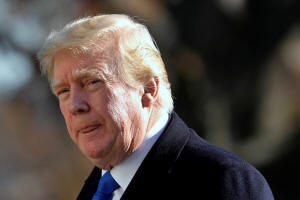Explainer: Could Trump preemptively pardon his family — or even himself?
 Send a link to a friend
Send a link to a friend
 [December 03, 2020]
By Jan Wolfe [December 03, 2020]
By Jan Wolfe
(Reuters) - U.S. President Donald Trump's
pardoning of his former adviser Michael Flynn has fueled speculation
over whether the president could pardon other associates, and even
members of his family, during his final weeks in office.
The New York Times reported on Tuesday that Trump talked with his
personal lawyer Rudy Giuliani about pardoning him as recently as last
week, citing two people briefed on the matter.
The Times also said Trump has asked advisers about the possibility of
"preemptively" pardoning his three eldest children.
In 2018, Trump even said he had the "absolute right" to pardon himself -
a claim many constitutional law scholars dispute.
Here is an overview of Trump's pardon power, which is sweeping but not
absolute.
CAN A PARDON BE PREEMPTIVE?
While pardons are typically given to people who have been prosecuted,
they can cover conduct that has not resulted in legal proceedings.

A pardon cannot apply to conduct that has not yet occurred.
The U.S. Supreme Court clarified this in a 1866 case, saying the pardon
power “extends to every offense known to the law, and may be exercised
at any time after its commission, either before legal proceedings are
taken or during their pendency, or after conviction and judgment.”
Most pardons are issued to people who have been prosecuted and
sentenced. But in 1977, President Jimmy Carter pardoned hundreds of
thousands of "draft dodgers" who avoided a government-imposed obligation
to serve in the Vietnam War.
ARE THERE LIMITS ON A PRESIDENT'S PARDON POWER?
The pardon power, which comes from the U.S. Constitution, is one of the
broadest available to a president. The nation's founders saw the pardon
power as a way to show mercy and serve the public good.
A pardon is not reviewable by other branches of government and the
president does not have to give a reason for issuing one.
But the pardon power is not absolute. Crucially, a pardon only applies
to federal crimes.
COULD TRUMP PARDON HIS CHILDREN AND INNER CIRCLE?
Yes. It is legal for Trump to pardon his inner circle, including members
of his family.
In 2001, former President Bill Clinton pardoned his brother, Roger, who
was convicted for cocaine possession in Arkansas.
Clinton pardoned about 450 people, including a Democratic Party donor,
Marc Rich, who fled the country because of tax evasion charges.
HOW BROADLY WORDED CAN A PARDON BE?
This is unclear.
The pardon former president Richard Nixon received from his predecessor
Gerald Ford was very broad, absolving Nixon for all criminal offenses he
committed or may have taken part in during his presidency.
But the U.S. Supreme Court has never ruled on whether such a broad
pardon is lawful. Some scholars have argued the nation's founders
intended for pardons to be specific, and that there is an implied limit
on their scope.
[to top of second column]
|

President Donald Trump walks on the South Lawn of the White House
upon his return to Washington from Camp David, U.S., November 29,
2020. REUTERS/Yuri Gripas/File Photo

WHAT WOULD TRUMP PARDON HIS CHILDREN OR GIULIANI FOR?
Trump's children have not been accused of any criminal wrongdoing,
and it is unclear what Trump would pardon them for.
Manhattan District Attorney Cyrus Vance, who enforces New York
state laws, has been conducting a criminal investigation into Trump
and his family company, the Trump Organization.
Vance, a Democrat, has suggested in court filings that his probe
could focus on bank, tax and insurance fraud, as well as
falsification of business records.
It is unclear what stage the investigation is at. No one has been
charged with wrongdoing.
Meanwhile, New York's Attorney General, Letitia James, has an
active tax fraud investigation into Trump and the Trump
Organization.
The inquiry by James, a Democrat, began after Trump's former lawyer
Michael Cohen told Congress the president inflated asset values to
save money on loans and insurance and deflated them to reduce real
estate taxes.
Trump's son, Eric Trump, an executive vice president for the firm,
was deposed in October because of what the attorney general
described as his close involvement in one or more transactions being
reviewed.
Republican Trump has called the Vance and James' probes politically
motivated harassment.
A presidential pardon, which can only be granted for federal
crimes, would not apply to either of these state probes.
Giuliani’s potential criminal exposure is unclear. Federal
prosecutors in Manhattan have been investigating his business
dealings in Ukraine. Giuliani has denied wrongdoing.

Giuliani also denied that he spoke to Trump about a pardon.
"Never had the discussion they falsely attribute to an anonymous
source," Giuliani said on Twitter on Dec. 1.
CAN TRUMP PARDON HIMSELF?
There is not a definitive answer to this question. No president has
tried it before, so the courts have not weighed in.
"When people ask me if a president can pardon himself, my answer is
always, 'Well, he can try,'" said Brian Kalt, a constitutional law
professor at Michigan State University. "The Constitution does not
provide a clear answer on this."
Many legal experts have said a self-pardon would be
unconstitutional because it violates the basic principle that nobody
should be the judge in his or her own case.
Trump could try to pardon himself preemptively to cover the
possibility of prosecution after he leaves office.
For a court to rule on the pardon's validity, a federal prosecutor
would have to charge Trump with a crime and Trump would have to
raise the pardon as a defense, Kalt said.
(Reporting by Jan Wolfe; Editing by Noeleen Walder and Edwina
Gibbs)
[© 2020 Thomson Reuters. All rights
reserved.] Copyright 2020 Reuters. All rights reserved. This material may not be published,
broadcast, rewritten or redistributed.
Thompson Reuters is solely responsible for this content. |